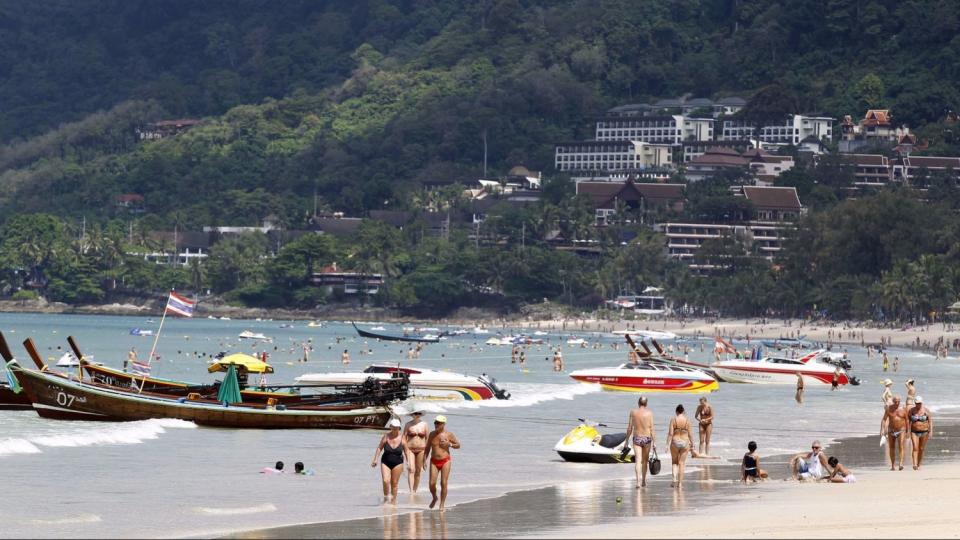Whether travel's a right or a privilege, it comes with responsibilities, travelers

In the time of coronavirus, every change to the travel landscape has given way to another change, which is the only constant in these strange times.
We talk a lot about the new normal. But Laurie Armstrong Gossy, a longtime media relations representative for San Francisco, has dealt with a dizzying array of upheavals because of coronavirus and thinks we should, instead, refer to these changes as the “next normal.”
Except for one shift, which I hope becomes our new normal: understanding that travel is a privilege and, as with all privileges, comes with responsibilities that have taken on greater urgency.
No less than the future of the travel industry lies in the balance, which is so precarious I want to mention it to you before I step away from my job as travel editor for the L.A. Times. You may see my byline again, because too many travel issues remain unresolved and too many travel questions are unanswered in the wreckage of COVID-19.
But as I try to bring some sense to the business aspects of travel, I also want to remind you — and by you, I mean us — of some issues to which we, not fate, hold the keys.
Why now?
That may seem a silly question. We know how devastating coronavirus has been to an industry we don’t always love but we always need, if only to feed our passion.
But as we have watched the debacle unfold, I’ve seen what may be an important shift in how we view travel.
If you’re old enough, you’ll recall our airline industry was shut down in the immediate aftermath of that terrible Tuesday, Sept. 11, 2001. It seemed like forever.
It was two days.
Commercial airlines sputtered and coughed back to some semblance of life by the end of the week, the L.A. Times reported. And in those many moments of rage, panic and sorrow, people decided travel was a right, which isn't exactly right. It's not like the ones guaranteed in, say, the First Amendment, which says our right to assemble peaceably shall not be abridged, or the Fifth, which says we shall not be deprived of our life without due process. Those are suffused with a desire for liberty and are bolstered by the gravitas of history, although as recent events have proved, even those are not always enough.
But the fervor that gripped the U.S. after 9/11 somehow turned travel into a patriotic duty. How many times did we hear, “If we don’t travel, the terrorists win?”
And so we traveled, and traveled, and traveled some more. The Great Recession slowed us, but low-cost carriers emerged as travel superstars that opened the world to those who previously couldn’t afford it, as did such sharing-economy innovations as Airbnb and ride-hail services.
The financial cost of seeing the world dropped but the physical cost of seeing the world skyrocketed. Just ask Amsterdam; Venice, Italy; the coral reefs anywhere in the Pacific; Iceland; many cruise ship ports of call; Angkor Wat, Cambodia; and Boracay Island, Philippines. And that’s just a brief list.
Signs of self?
“We cannot solve our problems,” Albert Einstein is often credited with saying, “with the same thinking we used when we created them.”
And therein lies the problem: What were we thinking? Of our right to travel? Or the fabulous Instagram posts we’d get? Or our fulsome bucket list, one of the most destructive terms ever to have been coined?
Was this travel’s new equation? Our rights plus kudos we get from social media plus bragging rights equal to what one of my college professors used to call “signs of self.”
We became careless with the world, and to what purpose?
We’ve been told since coronavirus hit that “we’re in this together.”
I don’t buy that. But what we are in together — or need to be — is the fight to keep from forgetting what a world refreshed by our absence might look like, if only anecdotally.
Weeks after an interview with William Heinecke, the chairman of Minor Corp., which has more than 530 hotels around the world, I am fascinated by something he said almost as an aside.

Phuket, Thailand, where he was sheltering in place, had never looked better, he said. The ocean water was clearer; the coral seemed to be healthier; the beaches weren’t covered in trash; even the hornbill birds had returned.
I am likewise haunted by the gallery of photos that shows our city skylines with stars, absent light pollution (bit.ly/nightskynolight).
And I want to celebrate what has been called a “return of wildlife” in our absence. I hear more birdsong in my backyard because, I feel certain, wildlife is so happy to be unmolested.
I doubt that’s true; what’s more likely is that I just never noticed. It’s anecdotal and situational, not scientific.
But even that — like Heinecke’s hornbills and those starry, starry nights — is something to celebrate. We stopped. We drew a breath. We saw. We listened.
And if we listen more closely, here’s what we will hear: Our duty that comes with privilege is even greater now. We must:
• Be mindful about what we are doing and consider whether the quest for the perfect photo is worth the price of admission.
• Remember that humankind’s creations are testaments to genius, but nature’s are a journey into majesty and mystery.
• Believe that lasting change — in ourselves and in our beliefs — is the reward for inserting ourselves carefully into another culture or another country as gracious guests.
Maybe, said Rick Steves, the guidebook author, tour operator and a thoughtful human being, this pause in travel will “make people more conscious when they travel that every decision they make does matter.”
Whether we’re living the next normal or the new normal, it matters now more than ever.

